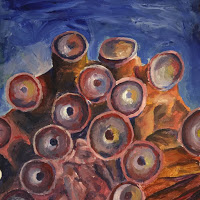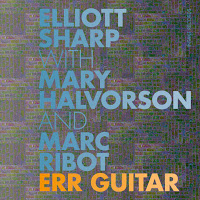Jessica Ackerly Trio – Coalesce (s/r, 2017) ****
The opening measures of this album may have you have thinking Mary Halvorson perhaps adopted an alter ego but that moment is fleeting as the Brooklyn based/Canadian transplant Jessica Ackerly proves to have invented her own angular and modern approach, and Halvorson is simply a touchstone. The opener ‘Clockwork’ has a captivating openness that expands in several direction simultaneously, free but melodic, you can hear Ackerly thinking with her fingers. ‘Discoid’ also allows for a lot of space, but takes a more deliberate and plodding approach that gets into some clean skronk – perhaps more like Marc Ribot or maybe Elliot Sharp at this point. A short solo track appropriately tiled ‘Solo Guitar’ showcases the guitarists use of open voicing and suspense. The trio is Matt Muntz on bass and Nick Fraser on drums. They give Ackerly the space and support that this guitar driven music thrives on, and it’s a blast.
Elliot Sharp, Marc Ribot, Mary Halvorson- Err Guitar (Intakt, 2017) ****
Scott DuBois – Autumn Wind (ACT, 2017) ****
Wind is New York based guitarist Scott DuBois’ second release on the Munich
based ACT, which like another famous Munich based label, is highly curated
and meticulous, with a strong interest in modern jazz. On Autumn Wind, DuBois tries to capture the visceral and metaphorical feel of autumn,
employing a group that features in demand bassist Thomas Morgan
(currently working with Bill Frisell), drummer Kresten Osgood, and reed player Gebhard Ullman. For a portion of the
tracks, DoBois has as string section for which he has written arrangements.
has an approach similar to the spaciousness and judicious intensity of
John Abercrombie and his writing is strong throughout. The first track,
‘Mid-September Changing Light’, begins with a throb of bass and DuBois’
carefully placed notes, building into a full but delicate duet of
bass and guitar. Moving along to ‘Mid-November Moonlit Forest’, lush
string passages give way to a rocking moment, like emerging from the
cradle of a tree covered path into a clearing full of a bright star
filled night sky. Hints of Americana and Ullman’s earnest reed work
follow that moment in ‘Late November Farm Fields’. ‘Early December Blue
Sky and Chimney Smoke’ is an upbeat and vigorous melody like a crisp
cold day while wispy clouds hang effortlessly in a baby blue sky.
Evocative, moving, and successful in it’s mission, DuBois’ concept is mature and meticulous.
In this two disc set, the each CD features the same set of compositions, the first set played solo with over dubbing on guitar, the other set with the band The Metaphysical Angels featuring Rua on guitars, Hernâni Faustino on bass,
Luís San Payo on drums,
Manuel Guimarães on piano, Nuno Reis on trumpet, and
Paulo Galão on clarinets. The first track ‘The Amazing Worm’ on the solo CD begins with acoustic guitar playing a single line melody, soon a brittle distorted electric guitar creeps playing chords like Ribot on Tom Wait’s Rain Dogs, and soon the track is becomes an intertwining mass of melodic vines. On the group CD the same song features clarinet and drums taking the electronic guitar lines. Electric guitar delivers the same chords, but the jerkily rhythmic melodies carried by the different instruments lends a totally different feel. Both versions have a feeling of chic decay, a crumbling delicate beauty, held together, but barely. The track ‘Flamenco is Dead’ is a quick shifting of textures from electric slashing and skronk to the smacks of bass strings, and musical shavings cluttering the floorboards. The group version? Well the mayhem is spread across a broader tonal pallets and sprays shards of musical debris everywhere. The lovely faded elegance of the title track evokes a past future, with skeletal melodies and distorted accompaniment on the solo side and an even more delicate full band version.






